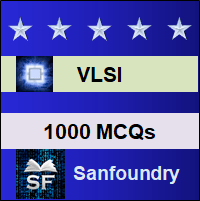
VLSI Multiple Choice Questions Highlights
- 1000+ Multiple Choice Questions & Answers (MCQs) in VLSI with a detailed explanation of every question.- These MCQs cover theoretical concepts, true-false(T/F) statements, fill-in-the-blanks and match the following style statements.
- These MCQs also cover numericals as well as diagram oriented MCQs.
- These MCQs are organized chapterwise and each Chapter is futher organized topicwise.
- Every MCQ set focuses on a specific topic of a given Chapter in VLSI Subject.
Who should Practice VLSI MCQs?
– Students who are preparing for college tests and exams such as mid-term tests and semester tests on VLSI.- Students who are preparing for Online/Offline Tests/Contests in VLSI.
– Students who wish to sharpen their knowledge of VLSI Subject.
- Anyone preparing for Aptitude test in VLSI.
- Anyone preparing for interviews (campus/off-campus interviews, walk-in interview and company interviews).
- Anyone preparing for entrance examinations and other competitive examinations.
- All - Experienced, Freshers and College / School Students.
VLSI Chapters
Here's the list of chapters on the "VLSI" subject covering 100+ topics. You can practice the MCQs chapter by chapter starting from the 1st chapter or you can jump to any chapter of your choice.- Introduction to MOS
- Basic Electrical Properties of MOS and BiCMOS Circuits
- MOS and BiCMOS Circuit Design Processes
- Basic Circuit Concepts
- Scaling of MOS Circuits
- Subsystem Design and Layout
- Illustration of the Design Process – Computational Elements
- Memory, Registers and Aspects of System Timing
- Practical Aspects and Testability
- Ultra-Fast VLSI Circuits and Systems – GaAS Technology
- MOS Transistor Theory
1. Introduction to MOS
The section contains multiple choice questions and answers on basic mos transistors, vlsi design, nmos and cmos fabrication and bicmos technology.
|
|
|
2. Basic Electrical Properties of MOS and BiCMOS Circuits
The section contains questions and answers on nmos, cmos and bicmos inverters, parameters of mos transistors, latch-up in cmos and bicmos logic gates.
|
|
|
3. MOS and BiCMOS Circuit Design Processes
The section contains MCQs on stick diagrams and design rules and layouts.
|
|
|
4. Basic Circuit Concepts
The section contains multiple choice questions and answers on sheet resistance, area capacitance, inverter and propagation delays, drivers, wiring capacitances, mos circuits, differential amplifiers and single stage amplifiers.
5. Scaling of MOS Circuits
The section contains questions and answers on mos circuits scaling factors and its limitations.
|
|
|
6. Subsystem Design and Layout
The section contains MCQs on switch logic, gate and cmos logics, system considerations, clocked sequential circuits and phase locked loops.
|
|
|
7. Illustration of the Design Process – Computational Elements
The section contains multiple choice questions and answers on design process, design of alu subsystem and multiplier systems.
|
|
|
8. Memory, Registers and Aspects of System Timing
The section contains questions and answers on storage elements, memory cells and flash memory.
|
|
|
9. Practical Aspects and Testability
The section contains MCQs on optimization of inverters, design styles using cif code and cad tools, floor layout, system delays, simulators, testing, guidelines for testability, lfsr, scan design techniques, cellular automata, test pattern, fault models, testing combinational and sequential logics, pseudo random test pattern and design for testing.
10. Ultra-Fast VLSI Circuits and Systems – GaAS Technology
The section contains multiple choice questions and answers on submicron cmos, gallium arsenide, doping process of ga, mesfet, gaas fabrication, device modelling and performance estimation, fet logic inverter, mesfet designs, gaas mesfet logic and fet.
11. MOS Transistor Theory
The section contains questions and answers on mos transistors, nmos and cmos, mos transistor threshold voltage, noise margin and noises in mos devices.
|
|
|
Wish you the best in your endeavor to learn and master VLSI!
